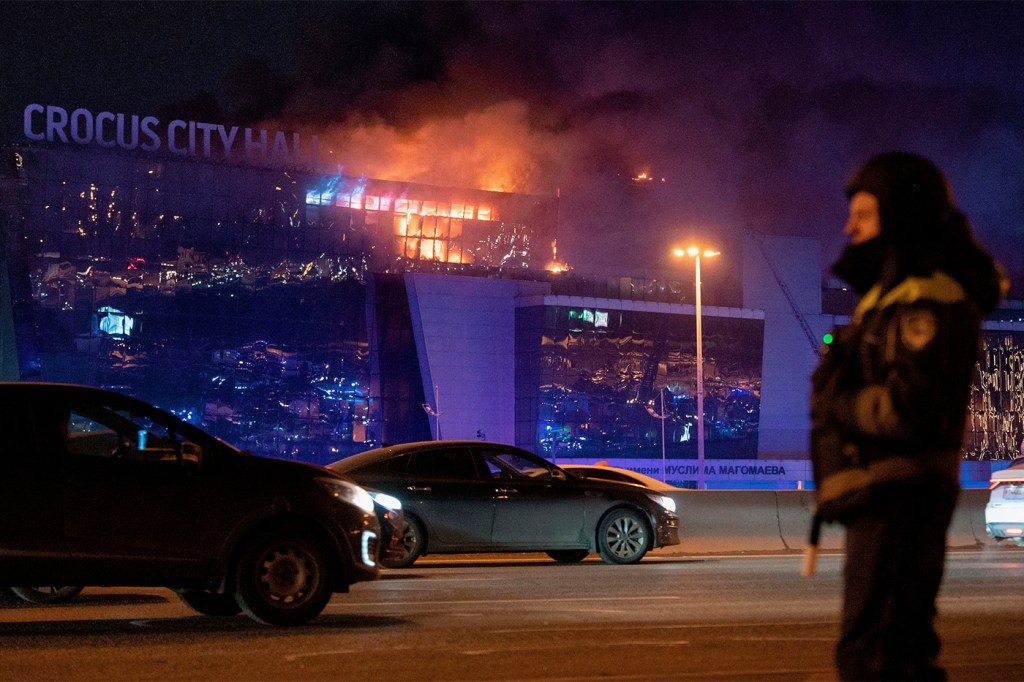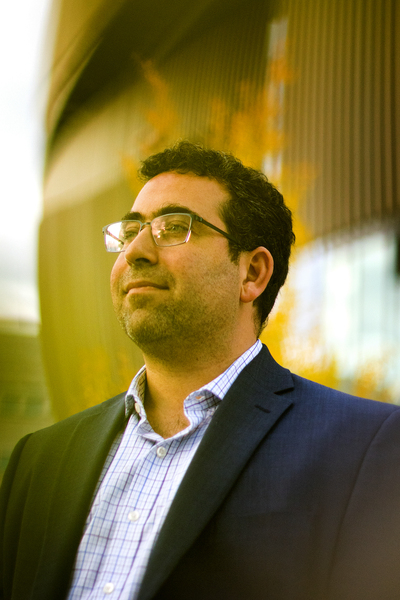Following Moscow attack, terrorism expert says ‘it’s only a matter of time’ before terrorists strike the US again
Max Abrahms, a leading expert on terrorism, breaks down the latest attack in Russia, and what it might signal for U.S. homeland security.

An attack at a concert hall in Moscow on Friday resulted in the deaths of more than 133 people, and injuries to over 100 others. Islamic State in Khorasan Province, a regional branch of the Islamic State (ISIS-K), claimed responsibility for the attack.
The group was founded in 2015, and has been responsible for a number of recent international attacks, including the attack on Kabul Airport in 2021 during the U.S. military withdrawal that resulted in the deaths of 13 Americans and more than 130 civilians.
Northeastern Global News spoke to Max Abrahms, associate professor of political science at Northeastern University, and a leading expert on terrorism, to get some background on ISIS-K. Abrahms breaks down the latest attack in Russia, and what it might signal for U.S. homeland security and other national security interests.
The conversation has been edited for brevity and clarity.
What do we know about this emerging ISIS affiliate group?
During the Islamic State’s high point — from its emergence in 2014 until roughly 2017-2018 — the group’s stronghold was in Iraq and Syria. The Islamic State, or ISIS, is not a very strategic group, as far as terrorist groups are concerned. There’s wide variation in how strategic terrorist groups are, and I would put the Islamic State on the low end. What it tried to do was kill as many people, especially civilians, in as many countries as possible; and the predictable effect was that it managed to create the largest counterterrorism coalition ever assembled.
Featured Posts
Even though countries all around the world disagree with each other on all sorts of matters, when it came to fighting ISIS there was near-consensus. So the Islamic State found itself in turn fighting against the United States, Europe, Russia, Iran, etc; and as a result, it was crushed. There were many rebel groups in Syria and they all viewed ISIS as somewhat of a pariah because of its absolutely over-the-top, unrestrained violence, as well as its promotion of its radical image over social media.
An analogy that I like to make is say you have some ducks sitting next to a lake. If somebody ran at the ducks, they would disperse for their survival. It’s a resilience mechanism, and terrorist groups tend to do the same thing. The Islamic State then metastasized into other areas, where there was less military opposition.
The exact same thing happened with al-Qaeda after 9/11. It was based in Afghanistan, and the United States went in and al-Qaeda metastasized and created affiliates in areas where the group could thrive. So Islamic State has been dispersed into the Sahel region, in parts of Africa, in Mozambique; and one of the places where it has found some space to establish itself as a viable organization is in Afghanistan.
ISIS-K is a complicated group, its target selection is seemingly growing. It directed its violence in Afghanistan and then recently it was behind a mass casualty attack in Iran, and now one in Moscow. I saw that France has raised its terrorism threat level in response to ISIS-K; so it’s targeting is quite broad.
Also, its recruitment is expansive — it now seems to be tapping into people from Central Asia. So it seems to be taking a more dangerous, international direction in terms of both its target choices as well as its membership.
Do you see the U.S.’s withdrawal from Afghanistan as potentially fueling the rise of ISIS-K?

That’s a good question, and I have mixed feelings about answering it. I did support the U.S. withdrawal from Afghanistan because I knew that nation-building was failing there. I did initially support the invasion after 9/11 because al-Qaeda — at least its leadership — was based there. However, over the years U.S. goals in Afghanistan shifted from mainly counterterrorism to mainly nation-building, and it was at that point that I favored the policy position that both the Biden and Trump administrations supported.
That said, I can’t disagree with those who say that the withdrawal has helped ISIS-K. That’s not an unreasonable conclusion. Right now, we are relying on our former enemies in Afghanistan, the Taliban, who quickly took over the government, as our counterterrorism forces against ISIS-K. That is concerning; but it’s also not the first time that the United States has been reliant on untrustworthy partners for counterterrorism purposes, as we did in Syria with the so-called rebels.
I think that if ISIS-K continues to commit operations around the world and is seen as the foremost international terrorism threat, the international community may invest more in Afghanistan to fight them. That could take the form of increasing military assistance to the Taliban, sharing more intel with them, as well as sponsoring other rebel groups which have been unsuccessful in attracting meaningful international assistance.
Why do you think ISIS-K targeted Russia in this attack? Is the attack part of a broader strategy?
I really don’t view the Islamic State as very strategic. It’s more about inflicting pain on its perceived enemies; and there are many reasons why ISIS views Russia as its enemy: Russia invaded Afghanistan in the 1980s; it fought against the Islamic State in Syria; it has waged a brutal campaign against Chechnya; so Russia has a longstanding history of grievances from the vantage of the Islamic State.
What does this latest attack mean for U.S. national security?
The terrorism threat level was raised following the Hamas terrorist massacre on Oct. 7. This is a dangerous time for the United States when it comes to the likelihood of a terrorist attack. Al-Qaeda has responded differently to the Hamas attack than ISIS did; Al-Qaeda, immediately following Oct. 7, came out and celebrated the attack, and I think that the government agencies have been watching al-Qaeda more closely since then because it has been more vocal and specific about its desire to strike the U.S. and target U.S. interests around the world, especially Jewish targets.
The Islamic State views itself as more at odds with Hamas because of their religious differences. For example, Hamas believes in elections; it participated in the election in Gaza, and won. Hamas also doesn’t practice Sharia law. Also Hamas is supported by Iran, and ISIS is very anti-Shia. But I think we have to worry about both al-Qaeda and the Islamic State, and I can’t emphasize that enough. The United States would be considered a very juicy target for ISIS and any of its affiliates or supporters around the world. I suspect it’s just a matter of time before there is another ISIS attack in the United States.










